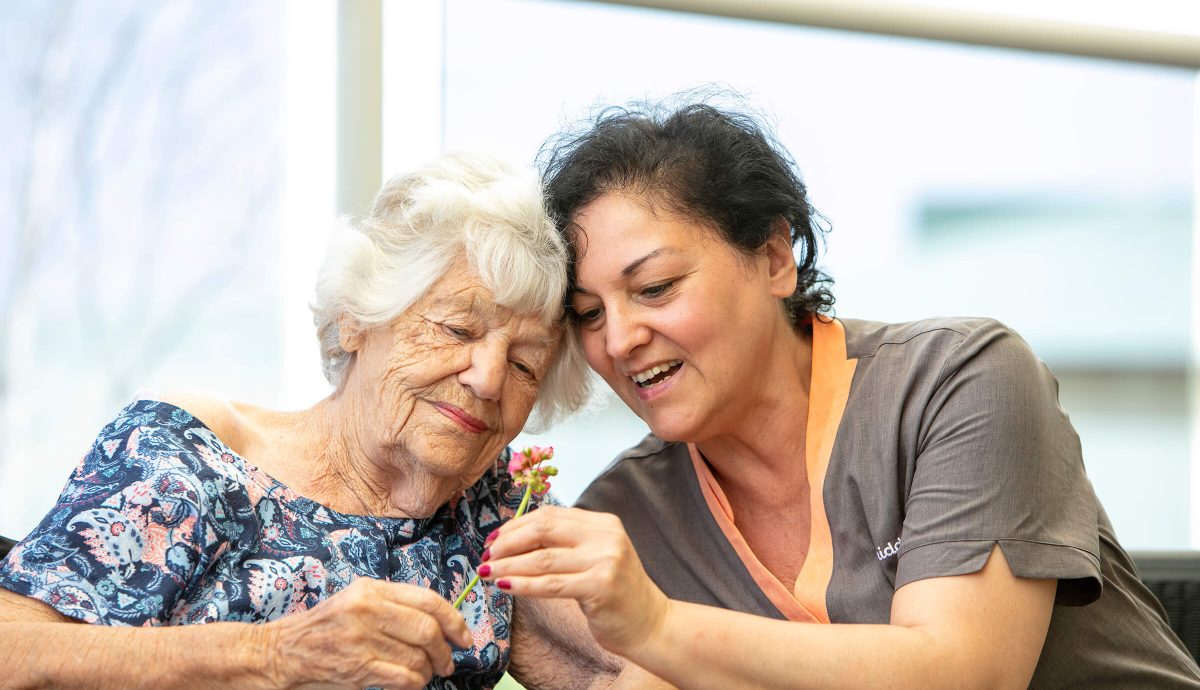
What makes a good aged care home?
As an aged care provider, we are often asked ‘what makes a good aged care home?‘.
Finding the right residential aged care home for you or your loved one can feel very overwhelming. After all, this is your new home that you’re looking into. Taking time to research a care home to understand if it offers the right care and support that meets your needs is important. So is understanding the different elements that go into choosing a good aged care home.
When researching aged care homes, physical visits will allow you to meet some of the carers, nurses and residents. This can help you to decide where you would feel comfortable, a place that feels homely and if the care home offers what you desire.
In addition, there are certain things you can look for, and ask about. From the care approach, wellbeing programs and food and dining experience, to allied health services and activities, there are many aspects to consider, that can help you make the right decision.
Top 4 things to look for when choosing a good aged care home
The care approach
We’re all unique and have our own individual needs, goals, preferences and life experiences. There’s no one-size-fits-all approach when it comes to care. That’s why searching for a provider that offers a person-centred and holistic approach to care is key. This approach sees residents receiving emotional, social and personal care and support that enhances their quality of life.
Another important aspect to consider is around decision-making and choice. Look for a provider that ensures residents and their families are true partners and decision-makers in their care. Ensure that the resident is placed at the very centre of care and that there is a focus is on what the resident can do – not what they can’t do.
Award-winning care provider, Whiddon, has a relationship-based model of care, MyLife, which sees staff truly getting to know residents by finding out what matters most to them and empowering them to build strong personal relationships.
Research and years of experience tells Whiddon that meaningful day-to-day relationships between staff and the people they care for are at the centre of great care. This helps to achieve a highly personalised level of care.
Lifestyle and wellbeing programs
When looking for a good aged care provider, ask about their wellbeing programs and lifestyle activities. This is because good programs can offer a range of physical and emotional benefits to residents living in an aged care home. They also offer important opportunities for social connection and creative expression. This all plays an important role in the overall quality of care in the aged care home.
Participating in wellbeing programs can be very enjoyable and help to create sense of purpose and community. Usually run by care workers or external partners, they’re a fantastic way to keep people connected while staying physically and mentally active. Participating in meaningful and purposeful activities and feeling part of a community are essential to your overall well-being.
Whiddon is a pioneer in the wellbeing and creative ageing field in Australia. They recognise strong connections between the arts and good health, and the lifelong benefits that creative therapies and programs offer to residents in aged care.
Creative ageing provides a sense of purpose to residents in aged care, while also building self-esteem and confidence that reduces anxiety, stress and depression. Creative ageing can also improve physical capability and cognition. More importantly, creative expression can be made available to everyone in some form, regardless of age, disability and frailty within aged care.
From programs involving chooks, intergenerational connection, social cooking programs, pet therapy and gardening programs, to art, music and dance, these programs help to ensure that Whiddon residents remain engaged and happy every day.
The food and dining experience
Food is an incredibly powerful and emotive topic for many people, particularly within aged care. It touches on many areas of our lives, experiences and memories and, for many cultures, is at the heart of how we socialise and celebrate with friends and family. For elderly people who are unwell or frail, food is something that can still bring great comfort, enjoyment, opportunities to socialise and of course, improve nutrition, health and wellbeing.
Food in aged care facilities is so important. So when looking for a care provider, ask for sample menus, talk to them about mealtimes and ask questions around the dining experience they offer. Do they use fresh, quality and seasonal local ingredients? Do they have flexible dining options, such as breakfast at a time that suits you if you prefer to sleep in, or do they offer extra special dining experiences on special days like birthdays or milestone celebrations?
Another aspect to consider is personal choice when it comes to food and dining. Are you able to provide input and feedback on the menu? Do they have a group or a resident meeting where the food and dining experience is a topic of conversation? And if you love to cook, are there opportunities to continue to enjoy this through the use of interactive kitchens or social cooking groups?
Transparency, quality and safety
A lack of transparency around the quality, safety and performance of an aged care provider can present a barrier for consumers and their families. It can make the decision of choosing the right provider more challenging, as consumers want to feel confident in receiving quality care from a provider.
The Royal Commission into Aged Care Quality and Safety recommended increased transparency of quality and safety performance from aged care providers. In response to this, the Federal Government is working on a star rating system, to help consumers make more informed choices about their aged care.
You can also do your own research. You can check an aged care provider’s service compliance rating and you can ask a provider a range of questions, to help you in your journey to finding the right care.
You can gain a better understanding about a provider by asking about their levels of compliance. Standards to consider include:
- Aged care quality standards
- Workforce data
- Staff to resident ratios
- Pricing and financial information
- Customer feedback
Some providers, such as Whiddon, are already providing reporting around his important information.
Leaving your home or familiar space and move into residential care is a big change. Remember to allow yourself or your family member time to prepare for this, and to research your options. This will help ensure that the new place to call home is the right one.




